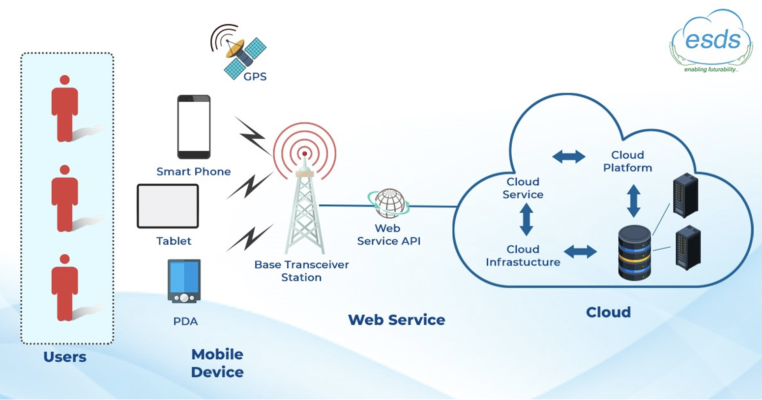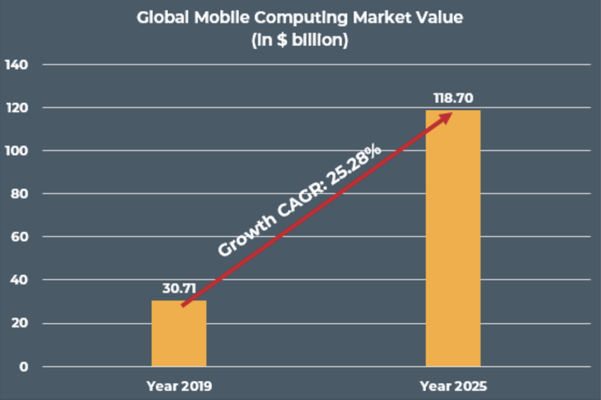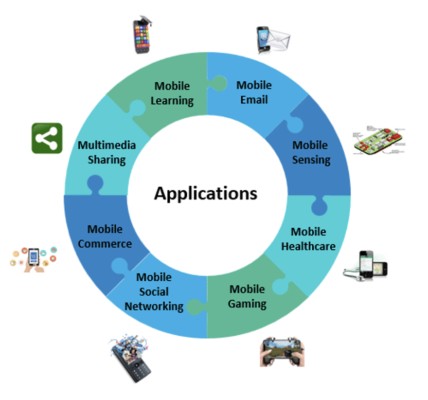App developers are increasingly ambitious to bring app users to the best experience: from accessing apps anywhere with an Internet connection, to finding their way to where they want to go. Users can also quickly find information about their loved ones or services they want or talk to their business partners. In the world of IoT, to control everything, first of all, you have to never lose connection with them. All of these come from the needs of users and challenges for developers.
Mobile Cloud Computing (MCC) is the answer to these problems. This approach is about developers using the strengths of the cloud to create the best mobile app they’ve ever had.
1. Your mobile app is not on your mobile. They are in the cloud!
When you use cloud computing to deliver your mobile application to the user’s phone, you are a developer using Mobile Cloud Computing (MCC). This idea is based on the speed, flexibility, and continuity of cloud computing to bring many different devices, with different configurations, different operating systems, and different data storage. This makes it possible for users to use the app with any mobile device they have [1]. If you first hear about cloud computing, you can summarize them as huge storage centers that store and analyze data with the latest technologies. We have a separate article on this topic. You can learn them from another blog. But don’t worry, the above should be enough for you to learn more about MCC. The image from esds.co.in helps you understand more about MCC’s architecture
 Mobile Cloud Computing’s architecture. Source: esds. (https://www.esds.co.in/blog/exploring-mobile-cloud-computing-esds/#sthash.v1ekjcfd.dpbs)
Mobile Cloud Computing’s architecture. Source: esds. (https://www.esds.co.in/blog/exploring-mobile-cloud-computing-esds/#sthash.v1ekjcfd.dpbs)
2. With MCC, everything is more efficient and takes less effort
New things are born to make you more convenient, mobile cloud computing is no exception. We’ll take you through some of their features [2]:
Even if your needs grow exponentially, you can still meet them with widely shared resources through the cloud.
You want to develop apps using multiple methods and create multiple versions of them to meet the needs of mobile and tablet users. MCC continues to grow to make this happen with you.
One of the reasons MCCs are trusted is because they also take advantage of the strengths that cloud computing brings. Security is one of the strengths that MCC fully inherits and does even better through tools from the application to secure user information.
Cloud computing helps users consume less on-premises resources while still achieving significant storage and computing power. MCC developers also benefit from this.
In short, MCC saves businesses money, provides the opportunity to discover many new features for users, and creates a lucrative market for network and cloud computing service providers. This is a vast area with a lot of potentials. According to esds, in 2019, the MCC market was worth $30.71 billion. They forecast the market will grow by about $80 billion after 6 years, by 2025, the market value will be at $118.70 billion. Hope this number will give you more motivation.
 MCC market predictions in 2025. Source: esds. (https://www.esds.co.in/blog/exploring-mobile-cloud-computing-esds/#sthash.v1ekjcfd.dpbs)
MCC market predictions in 2025. Source: esds. (https://www.esds.co.in/blog/exploring-mobile-cloud-computing-esds/#sthash.v1ekjcfd.dpbs)
3. Mobile cloud computing is not perfect yet
There are still problems you can run into when implementing MCC, even ones you haven’t encountered before [3]. One of them could be:
Low network access speed: currently, the network access speed of MCC is still slower than that of wired network access. However, this problem is gradually being overcome because more and more network operators are interested in counting this field.
New security issues: MCC is a new concept, the application of this technology by some managers can create security holes. In fact, this is something that is recommended by cloud service providers and is fixed by them constantly.
Service quality varies: due to Internet connection, the user experience may vary. Users may get different results than they expect when controlling the IoT application through their poor network connection. So this is also an issue you need to pay attention to.
Use more battery: this is not necessarily bad, but it makes users unhappy. Some features are not used as often but make their phone consume more battery, or users do not use the app to manage the smart home as much as they think, leading them to believe that draining battery is a minus point of MCC.
4. Lots of real-life MCC apps, and you can create them also
You probably remember the examples from the beginning. We talked a lot about how MCC improved the user experience and created multiple versions to help the app reach the maximum users. You can put almost everything in your current app to the cloud, as long as they have the data and need to accommodate a large number of users. The explosion of IoT devices also makes MCC an indispensable choice for these application developers.
Imagine apps for taking photos, recording videos, printing or music apps, movie apps, gaming apps. Even applications that perform complex tasks such as health monitoring, asset management, transaction execution, smart home control. You can also find popular apps like Dropbox, Amazon Cloud Player [3], or Google Cloud Print. All of them can be better by using MCC.
We’re not going to dive into the idea of making a great app using MCC, because you’re good at it. Tons of great apps are and will be supported by MCC, some may be yours in the future. You can sum up the above through a picture by eduba:
 Applications where MCC can be used. Source: eduba. (https://www.educba.com/mobile-cloud-computing/)
Applications where MCC can be used. Source: eduba. (https://www.educba.com/mobile-cloud-computing/)
5. Conclusion
Thank you for walking with us to the end of the article. Whoever you are, from someone interested in new topics to an IoT device salesman looking to grow his business, mobile cloud computing does not disappoint. They are still being developed by the hour, by the best people, from engineers of leading cloud computing providers to people with great ideas and huge momentum, all over the world. If you want to conquer this new thing, let us stand by and help you.
